专四语法与词汇补
英语专四考试词汇与语法详解
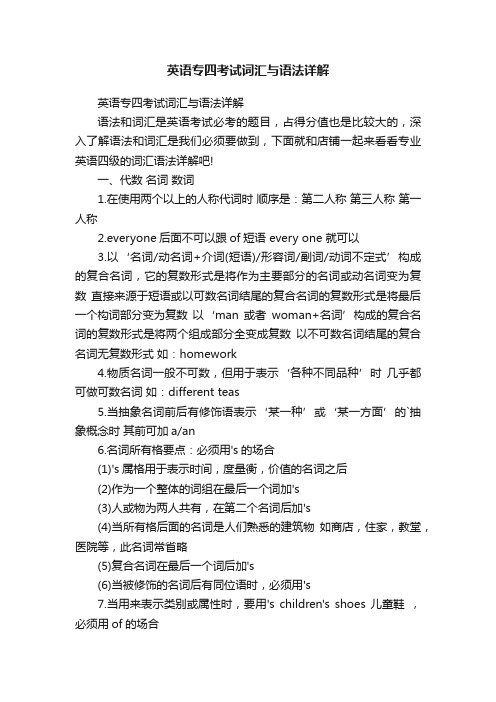
英语专四考试词汇与语法详解英语专四考试词汇与语法详解语法和词汇是英语考试必考的题目,占得分值也是比较大的,深入了解语法和词汇是我们必须要做到,下面就和店铺一起来看看专业英语四级的词汇语法详解吧!一、代数名词数词1.在使用两个以上的人称代词时顺序是:第二人称第三人称第一人称2.everyone后面不可以跟of短语 every one 就可以3.以‘名词/动名词+介词(短语)/形容词/副词/动词不定式’构成的复合名词,它的复数形式是将作为主要部分的名词或动名词变为复数直接来源于短语或以可数名词结尾的复合名词的复数形式是将最后一个构词部分变为复数以‘man 或者woman+名词’构成的复合名词的复数形式是将两个组成部分全变成复数以不可数名词结尾的复合名词无复数形式如:homework4.物质名词一般不可数,但用于表示‘各种不同品种’时几乎都可做可数名词如:different teas5.当抽象名词前后有修饰语表示‘某一种’或‘某一方面’的`抽象概念时其前可加a/an6.名词所有格要点:必须用's的场合(1)'s属格用于表示时间,度量衡,价值的名词之后(2)作为一个整体的词组在最后一个词加's(3)人或物为两人共有,在第二个名词后加's(4)当所有格后面的名词是人们熟悉的建筑物如商店,住家,教堂,医院等,此名词常省略(5)复合名词在最后一个词后加's(6)当被修饰的名词后有同位语时,必须用's7.当用来表示类别或属性时,要用's children's shoes 儿童鞋,必须用of的场合(1)名词后跟有后置修饰语或同位语时(2)以定冠词加分词或形容词表示一类人时如果dozen/score/hundred/thousand/million前有基数词以表示确切数目时,都不能用复数形式如果用来表示很多有不确切的数目时,须用复数,而且后面加of8.表示顺序的两种方式:(1)'名词+基数词',不用冠词,如Chapter four(2)' the+序数词+名词' 如the Fourth Chapter9.倍数增减的表示法(1) 倍数+形容词/副词比较级+than(2) 倍数+as+形容词/副词+as(3) 倍数+名词(4) 动词+百分比或倍数(5) 动词+to+数词(6) double/triple/quadruple+名词(7) 动词+by+数词/百分比/倍数10.分数分子为基数词,分母为序数词分母除了在分子为一的其他情况下为复数11.百分比后接名词时加of二、形容词副词(1)前置修饰语的排列顺序可以至于冠词前的形容词(all both such) -----冠词,指示形容词,所有格形容词,不定形容词(a an the this your his any some)-----------基数词(one ) 序数词(first)------------ 表示性质,状态,质量的形容词(good useful)--------------表示大小,长短,形状的形容词----------------表示年龄,新旧,温度的形容词------------表示颜色的形容词---------------------表示国籍,产地,区域的形容词-----------表示材料,用做形容词的名词----------动名词,分词(2)后置修饰语由前缀a-构成的形容词(3)形容词修饰由some-,any-,every-,no-,-body,-one,-thing等组成的复合不定代词时,必须后置(4)enough作形容词修饰名词时既可放前又可放后,但当它作副词修饰形容词或副词时,必须后置(5)有些形容词本身就有’比…年长‘,’比…… 优等的意思这些形容词后面用介词to 而不用than(6)much too 作为副词短语修饰形容词或副词,不修饰名词(7)more 不能用来修饰比较级(8)与名词连用的more of a …/as much of a…/more of a…意为更像…(9)as much o f a…意为称得上,less of a 意为算不上(10)none other than(不是别人,正是)=no other than(11)any/some/every与other连用时,其后若用可数名词,一般为单数三、情态动词(1)can 用于否定句cannot(help)but表示不能不,只能(but后跟不带to的动词不定式)(2)must 表示禁止,一定不要时的否定式为mustn't 当它表示有把握的推断时意为一定准是时它的否定形式为can't(3)need doing=need to be done 这个句型表示被动意味(4)need not have done sth 表示本来没有必要做某事 (经常考)四、虚拟语气从句主句(1)与过去事实相反 had+过去分词 should(第一人称)would(其它人称)+have+过去分词与现在事实相反一般过去式(动词be用were) would/should/could/might+动词原型与将来事实相反过去式或should/were+动原would/should/could/might+动词原型(2)It is (high/about/the)time……谓语动词用过去式指现在或将来的情况表示早该做某事而现在已经有点晚了(3)It is the first(second/third)time后的that从句中,谓语动词要用完成体来表示一种经验(4)as if/though 的虚拟要点(5)对当时事实的假设,从句谓语用过去式,be动词一律用were(6)对过去事实的假设,从句谓语用过去完成式(7)对未来事实的假设,从句谓语用would+动词原型【英语专四考试词汇与语法详解】。
专四语法与词汇
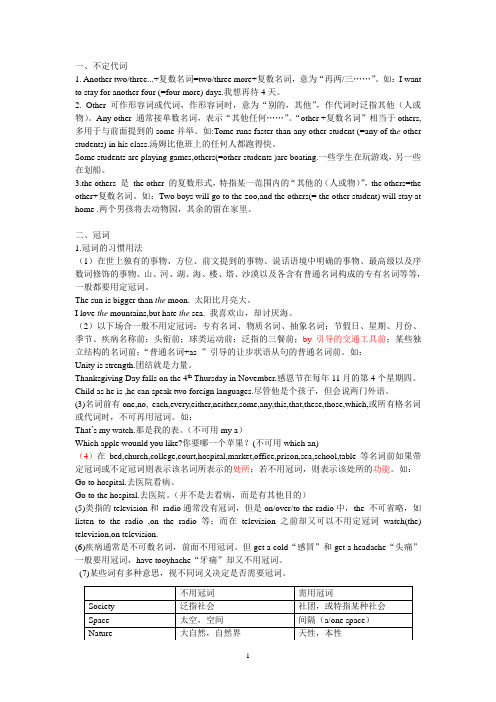
一、不定代词1. Another two/three...+复数名词=two/three more+复数名词,意为“再两/三……”。
如:I want to stay for another four (=four more) days.我想再待4天。
2. Other 可作形容词或代词,作形容词时,意为“别的,其他”,作代词时泛指其他(人或物)。
Any other 通常接单数名词,表示“其他任何……”。
“other +复数名词”相当于others,多用于与前面提到的some并举。
如:Tome runs faster than any other student (=any of th e other students) in his class.汤姆比他班上的任何人都跑得快。
Some students are playing games,others(=other students )are boating.一些学生在玩游戏,另一些在划船。
3.the others 是the other 的复数形式,特指某一范围内的“其他的(人或物)”,the others=the other+复数名词。
如:Two boys will go to the zoo,and the others(= the other student) will stay at home .两个男孩将去动物园,其余的留在家里。
二、冠词1.冠词的习惯用法(1)在世上独有的事物、方位、前文提到的事物、说话语境中明确的事物、最高级以及序数词修饰的事物、山、河、湖、海、楼、塔、沙漠以及各含有普通名词构成的专有名词等等,一般都要用定冠词。
The sun is bigger than the moon. 太阳比月亮大。
I love the mountains,but hate the sea. 我喜欢山,却讨厌海。
(2)以下场合一般不用定冠词:专有名词、物质名词、抽象名词;节假日、星期、月份、季节、疾病名称前;头衔前;球类运动前;泛指的三餐前;by 引导的交通工具前;某些独立结构的名词前;“普通名词+as ”引导的让步状语从句的普通名词前。
英语专四语法、词汇知识大全
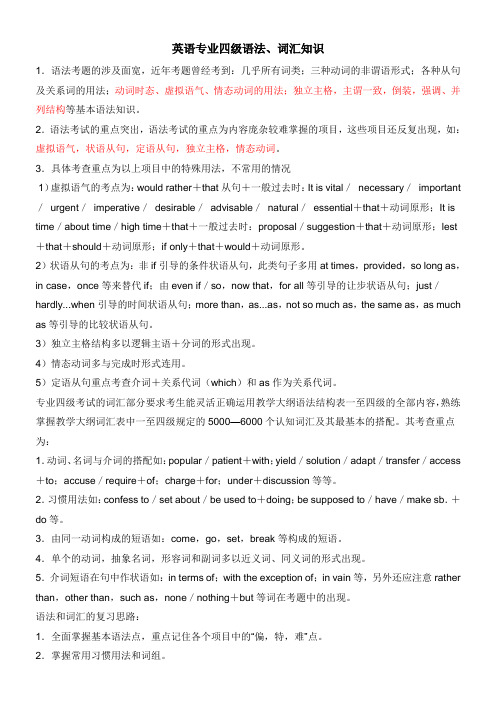
英语专业四级语法、词汇知识1.语法考题的涉及面宽,近年考题曾经考到:几乎所有词类;三种动词的非谓语形式;各种从句及关系词的用法;动词时态、虚拟语气、情态动词的用法;独立主格,主谓一致,倒装,强调、并列结构等基本语法知识。
2.语法考试的重点突出,语法考试的重点为内容庞杂较难掌握的项目,这些项目还反复出现,如:虚拟语气,状语从句,定语从句,独立主格,情态动词。
3.具体考查重点为以上项目中的特殊用法,不常用的情况1)虚拟语气的考点为:would rather+that从句+一般过去时:It is vital/necessary/important /urgent/imperative/desirable/advisable/natural/essential+that+动词原形;It is time/about time/high time+that+一般过去时:proposal/suggestion+that+动词原形;lest +that+should+动词原形;if only+that+would+动词原形。
2)状语从句的考点为:非if引导的条件状语从句,此类句子多用at times,provided,so long as,in case,once等来替代if;由even if/so,now that,for all等引导的让步状语从句;just/hardly...when引导的时间状语从句;more than,as...as,not so much as,the same as,as much as等引导的比较状语从句。
3)独立主格结构多以逻辑主语+分词的形式出现。
4)情态动词多与完成时形式连用。
5)定语从句重点考查介词+关系代词(which)和as作为关系代词。
专业四级考试的词汇部分要求考生能灵活正确运用教学大纲语法结构表一至四级的全部内容,熟练掌握教学大纲词汇表中一至四级规定的5000—6000个认知词汇及其最基本的搭配。
专业四级考前语法词汇恶补
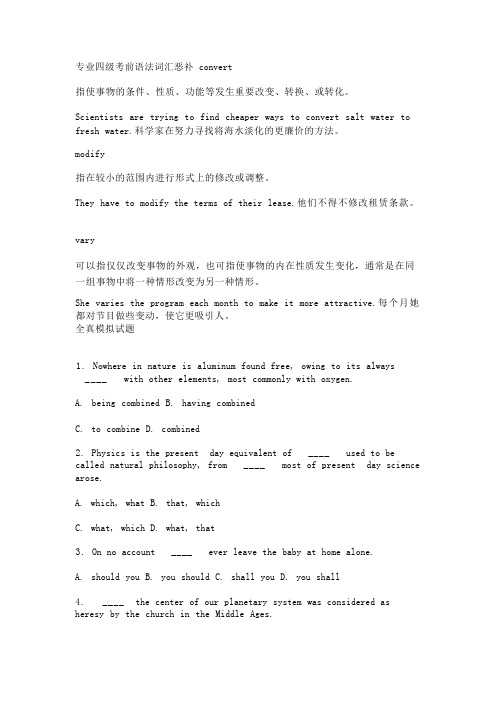
专业四级考前语法词汇恶补 convert指使事物的条件、性质、功能等发生重要改变、转换、或转化。
Scientists are trying to find cheaper ways to convert salt water to fresh water.科学家在努力寻找将海水淡化的更廉价的方法。
modify指在较小的范围内进行形式上的修改或调整。
They have to modify the terms of their lease.他们不得不修改租赁条款。
vary可以指仅仅改变事物的外观,也可指使事物的内在性质发生变化,通常是在同一组事物中将一种情形改变为另一种情形。
She varies the program each month to make it more attractive.每个月她都对节目做些变动,使它更吸引人。
全真模拟试题1. Nowhere in nature is aluminum found free, owing to its always____ with other elements, most commonly with oxygen.A. being combinedB. having combinedC. to combineD. combined2. Physics is the present day equivalent of ____ used to be called natural philosophy, from ____ most of present day science arose.A. which, whatB. that, whichC. what, whichD. what, that3. On no account ____ ever leave the baby at home alone.A. should youB. you shouldC. shall youD. you shall4. ____ the center of our planetary system was considered as heresy by the church in the Middle Ages.A. It is the sun and not the earthB. That the sun and not the earthC. Being the sun and not the earthD. The sun and not the earth5. The reason that his property was confiscated by the country, it____ , was that he was involved in a lot of fraudulent activities during the war.A. was turned outB. was being turned outC. being turned outD. turned out6. I’d rather you ____ by train because the weather forecast said there would be heavy snow tomorrow.A. wentB. should goC. will goD. go7. Einstein won the Nobel Prize in 1921 and enjoyed great fame in Germany until the rise of Nazism ____ he was expelled from Germany because he was a Jew.A. whenB. whoC. thenD. which8. Nowhere but in the remotest region of the country ____ find a place to settle down.A. can heB. he canC. heD. for him to9. With one leg broken in that car accident, he cannot even walk,run.____A. let aloneB. that’s to sayC. not to speakD. not to mention10. ____ , she led a life of complete seclusion.A. Being disgracedB. DisgracedC. DisgracingD. She was disgraced11. Sometimes a bus ____ gets on the bus to check the tickets.A. agentB. officerC. conductorD. inspector12. He made a quick ____ from his illness.A. reliefB. recoveryC. survivalD. relaxation13. ____ the stress of examinations are over, we can all relax.A. WhileB. Even thoughC. Now thatD. For14. My cousin Nancy is often in a poisonous mood ; I suppose it’s because she is ____ child.A. oneB. a loneC. a singleD. an only15. ____ the factors already referred to, people sometimes feel insecure because their motives are misunderstood by others.A. But forB. Except forC. Apart fromD. Except that16. If the scheme is ____ carried out without waste of time or energy I shall be completely satisfied.A.relativelyB.noticeablyC.appropriatelyD. efficiently17. One day we all may find it useful to have a(n) ____ for sending documents,writing any pictures across the telephone lines.A. receiverB. echoC. extensionD. facility18. To their credit the Department of Energy ____ these ideas and funded a detailed study.A. took overB. took onC. took upD. took to19. Feeling that she was in the right, she took ____ at the dirty remark.A. protectionB. offenseC. defenseD. guard20. They agreed to share in common any ____ of funds after all expenses were paid in full.A. sufficiencyB. surpassC. excessD. surplus21. He was ____ her in intelligence.A. belowB. underC. beneathD. down22. It took a lot of imagination to come up with such an ____ plan.A. brightB. cleverC. brilliantD. ingenious23. In the refining process, rice and flour lose much of their____ .A. acidB. alcoholC. vitaminD. sulphur24. Individual lines of the poem were very beautiful, but I didn’t see how the lines fit together. To me, the poem wasn’t ____ .A. inherentB. coherentC. logicalD. corporate25. To an especially sensitive child, a simple scolding can be a____ experience.A. hystericalB. grievousC. graciousD. sensible您的得分率为: / 25试题答案与解析1. A) 【句意】由于铝总是和其它元素结合在一起,最常见的是和氧气在一起,所以自然界中哪里也不会找到单独的铝元素。
专四语法词汇(强化班修改)
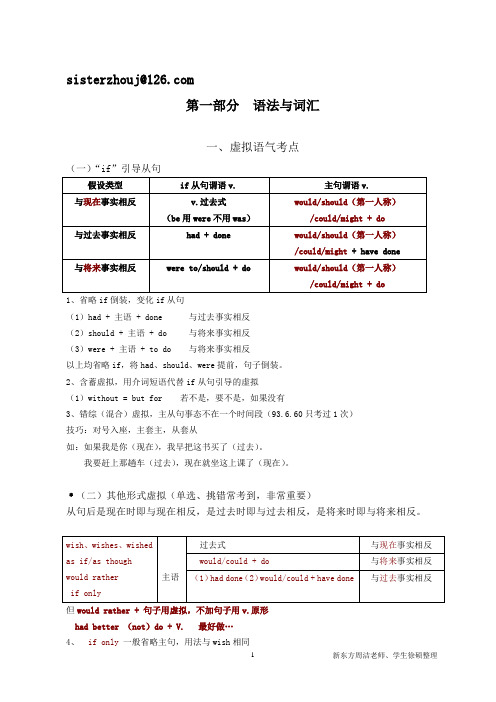
sisterzhouj@第一部分语法与词汇一、虚拟语气考点(一)“if”引导从句1、省略if倒装,变化if从句(1)had + 主语 + done 与过去事实相反(2)should + 主语 + do 与将来事实相反(3)were + 主语 + to do 与将来事实相反以上均省略if,将had、should、were提前,句子倒装。
2、含蓄虚拟,用介词短语代替if从句引导的虚拟(1)without = but for 若不是,要不是,如果没有3、错综(混合)虚拟,主从句事态不在一个时间段(93.6.60只考过1次)技巧:对号入座,主套主,从套从如:如果我是你(现在),我早把这书买了(过去)。
我要赶上那趟车(过去),现在就坐这上课了(现在)。
﹡(二)其他形式虚拟(单选、挑错常考到,非常重要)从句后是现在时即与现在相反,是过去时即与过去相反,是将来时即与将来相反。
但would rather + 句子用虚拟,不加句子用v.原形had better (not)do + V. 最好做…4、if only一般省略主句,用法与wish相同5、用表示建议、命令、要求等词引导的虚拟从句中,am、is、are原形即be解题方法:找出标志词;找出动词原形:do(主动)、be done(被动)(1)用表示建议、命令、要求等V.引导的宾从中公式:主语 + 谓语v.(必认词)+ 主语 +(should)+ do/be done必认v. suggest,propose,order,ask,require,request,desire,demand,insist,command,recommend,move,urge,advise(2)用于与建议、命令、要求等V.意义类似的形容词所引导的从句公式:It is + adj. (必认词)+ that + 主语 +(should)+ do/be done必认adj. suggested,proposed,ordered,asked,required,requested,desired(desirable),demanded,commanded,recommended,urgent,advisable,important,vital,essential,necessary (3)与表示建议、命令、要求等v.相类似的n.引导的表语从句和同位语从句表从公式:主语 + 系词 + that + 主语(should) + do/be done同位从公式:n. + that + 主语(should)+ do + do/be done必认n. suggestion,proposal,order,requirement,request,desire,demand,insistence,requirement,request,desire,demand,insistence,commandation,motion,recommendation,advice6、 It's/was/ + time + that + 主语 + did(过去式)早该到…的时间了/high time/about time7、跳层虚拟公式:真实,otherwise / or + 虚拟虚拟,but +真实(一般考过去时)特点:真实——过去时或 must have done,对过去肯定猜测虚拟——would / could + have done(三)情态v. + have done ,表示对过去事情的推测must + have done 肯定,没有musn't(表禁止…)could + have done 本能够,可能做(但未做)couldn't + have done 一定未发生,一定没能may + have done 本可能,或许might+ have done 本可能should = ought to + have done 本应做,而未做(含责备)shouldn't = oughtn't to + have done 本不应做而做了(含责备)未考过的needn't + have done 没有必要做而做了(无责备)need 情态v.“必要” + v.实义v.“需要” + need doing(形式主动,实际被动) = need to be done“需要”need + to do二、非谓语动词(一)不定式:to do / not to do1、形式(时态/语态), vt.(vi.只有主动)基本形式:注意:不定式的一般式表示动作与主句的动作将要发生或同时发生,而不定式的完成式表示动作要先于主句的动作前发生,不定式的完成式不能作定语。
限定词和补语等专四语法1

能接双宾语的动词
• • • • • • • • award sb sth 奖励某人 bring sb sth 把某物带给某人 offer sb sth owe sb sth 欠某人某物 pay sb sth 付给某人某物 show sb sth write sb sth promise sb sth
共存性:前位限定词一般互相排斥,不能 共存。 例如我们不能说:all half my salary, half double her income
中位限定词
1)种类: ①冠词the, a, an。例如:all the book, half an hour, twice the size; ②物主形容词my, your, his, her, our, their。 例如:all my money, all his money; ③指示形容词this, that, these, those。例如: all these problems, twice that size, four times this amount; ④名词属格。例如:John’s, his father’s
一般的句式:verb+sb+sth=verb + sth.
+ to + sb. 这类动词后面的间接宾语后置时,间 接宾语前要用介词to。 Please show me your passport. →Please show your passport to me. 请把护照给我看一下。 But, our textbook has some new rules.
• • • • • • •
1. How the book will sell depends on its author. key: subject 2. In one's own home one can do what one likes. direct object 3. The club will give whoever wins a prize. Indirect object 间接宾语 4. My question is who will take over president of the Foundation. • predicative 表语 • 我的问题是谁将接任该基金会主席职位。
专业四级词汇语法复习的技巧有哪些

专业四级词汇语法复习的技巧有哪些对于英语专业的学生来说,专业四级考试是一个重要的关卡。
而词汇和语法作为英语学习的基础,在备考专业四级考试中占据着至关重要的地位。
掌握有效的复习技巧,可以帮助我们更高效地提升词汇量和语法水平,从而在考试中取得优异的成绩。
接下来,我将为大家分享一些专业四级词汇语法复习的实用技巧。
一、词汇复习技巧1、制定合理的学习计划词汇的积累是一个长期的过程,因此制定一个合理的学习计划是非常必要的。
可以根据自己的时间和精力,将需要掌握的词汇分成若干个小组,每天安排一定的时间进行学习和复习。
同时,要注意合理安排学习的进度,避免过于紧张或过于宽松。
2、多种方式记忆词汇单纯的死记硬背往往效果不佳,我们可以采用多种方式来记忆词汇。
比如,可以通过联想法,将新学的词汇与已知的事物、场景或经历联系起来,这样更容易记住;还可以利用词根词缀法,掌握常见的词根词缀,有助于推测生词的意思;此外,制作单词卡片,随时随地进行复习,也是一个不错的方法。
3、阅读中积累词汇阅读是扩大词汇量的有效途径。
通过阅读英语文章,我们可以接触到各种语境下的词汇,不仅能够更好地理解词汇的用法,还能加深记忆。
在阅读过程中,遇到不认识的单词,不要急于查字典,可以先根据上下文猜测词义,阅读结束后再进行查阅和整理。
4、运用词汇学习词汇的目的是为了运用,因此要积极创造机会运用所学的词汇。
可以通过写作、口语练习等方式,将词汇融入到实际的语言表达中,这样能够更加牢固地掌握词汇。
5、利用词汇软件和工具现在有很多优秀的词汇学习软件和在线工具,如百词斩、沪江开心词场等。
这些工具可以根据我们的学习情况制定个性化的学习方案,还提供了各种有趣的学习方式和测试,有助于提高学习的积极性和效果。
二、语法复习技巧1、系统学习语法知识首先,要对英语语法的体系有一个全面、系统的了解。
可以选择一本权威的语法教材,按照章节逐一学习,掌握各种语法规则和用法。
在学习过程中,要注意做好笔记,整理归纳重点和难点。
专四补充

gaze v.凝视,注视,指由于好奇、感叹、长时间目不转睛地看。
She gazed at her beautiful new diamond ring.她凝视着自己的这颗美丽崭新的钻戒。
gape v. (张着嘴、瞪大眼睛)呆看,强调一种吃惊的状态。
The children gaped at the big elephant in the zoo.在动物园,孩子们张大了嘴巴呆呆地看着大象。
glance v. (粗略地、随便地)一瞥,看一眼。
He glanced over the letter he had just received.他把刚收到的那封信粗略地看了一遍。
glare v.怒目而视,强调怀有敌意或在气愤的情绪下看;眩目地照射。
The woman glared at the man after he shouted rudely at her.那男人粗暴地冲她大声喊叫,她也怒目而视。
glimpse v.与glance意思相近,短促地看一眼,一瞥。
peer v.指眯起眼睛仔细看,尤指看不清楚的情况下;费力地看,凝视。
Being somewhat short-sighted, she has the habit of peering at people.因为有点近视,她有眯着眼睛看人的习惯。
peep v.窥视,偷看。
The mother peepedsintosthe bedroom to see if her child was asleep.母亲偷偷向卧室看了一下,看她的孩子是否睡着了。
stare v.凝视,盯着,指由于好奇、惊讶、赞叹等原因而瞪大眼睛长时间地、直接地注视,常常含有粗鲁无礼的意思。
I told my son to stop staring at that fat woman; it wasn't nice.我告诉儿子不要盯着那个胖女人,那样看人不礼貌。
need”作为实义动词时,通常用法是:人+need +to do1.We need to collect the parcel before we leave for England.去英国之前,我们需要收拾好行李。
- 1、下载文档前请自行甄别文档内容的完整性,平台不提供额外的编辑、内容补充、找答案等附加服务。
- 2、"仅部分预览"的文档,不可在线预览部分如存在完整性等问题,可反馈申请退款(可完整预览的文档不适用该条件!)。
- 3、如文档侵犯您的权益,请联系客服反馈,我们会尽快为您处理(人工客服工作时间:9:00-18:30)。
This company has now introduced a policy _______ pay rises are related to performance at work. A. which B. where C. whether D. what 答案是B。先翻译一下:这家公司现在采用了一项制 度,加薪和业绩挂钩。选C和D的童鞋多半是没看懂意 思。类似的从句中,很多童鞋分不清到底该which/that 还是where,给个小诀窍 :(先行词)后的句子是否 完整。如果完整,考虑where;如果不完整,说明缺 成分,考虑which/that。
I _________ this soup. I _________ pepper in it. A. am tasting ... am tasting B. am tasting ... taste C. taste ... am tasting D. taste ... have tasted 答案是B。奉上解释:第一个taste是动态动词,根据 题意用了进行时;第二个taste是感觉动词,属于静态 动词,一般不用进行时的。
If you _______, you'd better go outside in the fresh air. A. faint B. have fainted C. are going to faint D. will faint 答案是C。看来童鞋们对这题有点纠结。If从句中的现 在时无现在语意,与主句不符;完成时也不合题意。 If从句中一般不用will将来时,只能用be going to形式 表示“如果现在有迹象表明你将要昏倒”,使得从句 和主句表达的现在语意相照应。
Half the excuses she gives are not true, but she always seems to _______ them. A. get on with B. get away with C. get up from D. get in on 正确答案是B。大部分同学都选对了!这句话的意思 是:她给的借口一半都不是真的,可她却似乎总能侥幸 过关.get on with与。。。友好相处;get up from 从。。。起来;get in on参加;get away with被放过; (做坏事)不受处罚
ห้องสมุดไป่ตู้
They are _________ the woods for the missing child. A. seeking B. looking C. investigating D. combing 答案是D。comb“彻底搜查”(相当于search thoroughly),其他三词seek (寻找)、look (看)、investigate (调查),都不能以woods作 为宾语。
What a pretty baby, Mrs Jones! I can see that he takes ________ you! A. after B. over C. up D. from A take after“长得像(父母)”, take over“接管,接收”, take up“开始从事”, take from“减少,降低”。
He showed his _______ for the TV programme by switching it off. A. distaste B. discontent C. annoyance D. boredom 答案为A。distaste“厌恶”常与介词for连用。 其他三个名词的常见用法为:discontent over/with;annoyance with sb./at sth.; boredom则不可与for连用。
The parents were worried about Dorothy because no one was aware ________ she had gone. A. where that B. of where C. where D. the place B这题考察的是aware的用法。aware一般有两个结构 比较常见:be aware of something和be aware thatclause,这题中aware of后加名词性从句,相当于第 一个结构。
Western Nebraska generally receives less snow than ______ eastern Nebraska. A. in B. it receives in C. does D. it does in 确实是C,倒装的用法,正过来应该是eastern Nebraska receives。 选D的同学可以思考下it does in中的it指代什 么呢?无论是指代前面的Western Nebraska 还是snow都说不太通。
I must take this watch to be repaired; it ________ twenty minutes a day. A. increases B. progresses C. accelerates D. gains 答案为D。gain在此句中表示钟表走得太快 (相当于move too fast),很常见的表达呐!
专四语法与词汇补充练习
The business is risky, but __________________, we would be rich. A. would we succeed B. could we succeed C. should we succeed D. we could succeed C
I'm surprised at there _________ an index. A. not to be B. to be not C. not being D. being not 答案是C。这是there be非限定形式作介词补 足语,通常用ing形式。如果是否定形式,那 么否定词not应放在非限定形式前面。注意, there be作介词for的补足语时,常用there to be形式。
I don't think he is to blame, _______? A. do I B. is he C. isn't he D. does he 答案是B,本句涉及的是否定的转移问题,I don't think中的否定词否定的是宾语从句,故 附加疑问句就需要用肯定的形式。
This __________ girl is Mary's cousin. A. pretty little Swedish B. Swedish little pretty C. Swedish pretty little D. little pretty Swedish 答案是A。一般按下列词序排列:限定词—说 话人的评价-大小、形状、新旧-颜色-国别、 来源、材料-用途、目的。
Which of the following is CORRECT? A. Do you mind if I opened the window? B. Would you mind if I opened the window? C. Do you mind me to open the window? D. Would you mind me to open the window? 答案是B。表示客气的请求可以使用would或do引导的 疑问句,但是would you mind后的if从句中要用虚拟式, 而 do you mind后的if从句中则使用直陈式,如 Do you mind if I open the window?另外,mind后可跟ing,而不可跟不定式。
